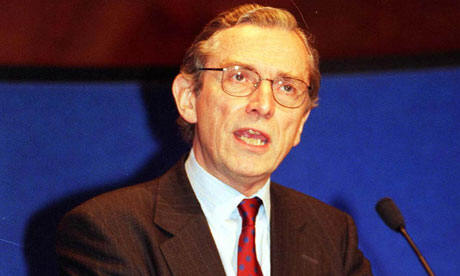
[AIDS Inc must feel the need for a propaganda drive. 'Useful idiot' (at best) politicians can always be relied upon to do the dirty work.]
• Fowler launched 1980s HIV
publicity drive
• Prevention and treatment methods to be reviewed
29 December 2010
http://www.guardian.co.uk/society/2010/dec/29/lord-fowler-hiv-aids
Nearly 25 years after he persuaded Margaret Thatcher's government to mount a hard-hitting and controversial publicity campaign against HIV/Aids, the former health secretary Norman Fowler is heading a House of Lords investigation into the continuing spread of the disease.
"We're on the verge of having 100,000 people in the UK infected and we want to look at what we can do about it," Fowler told the Guardian. "If I look back on my campaign in 1986, a number of issues came out of it which are quite relevant today, such as the whole issue of public education. In 1986, the government could harness all the powers of the media to do it on a national basis. There is a case for seeing how effective public education has been over the last 25 years and what lessons we should take from that."
Fowler will chair an ad hoc committee of the House of Lords to review the success of efforts to prevent and treat HIV/Aids in the UK. The six-month investigation will also look at efforts to get people diagnosed early, which increases their chances of survival, and the stigma and discrimination associated with the disease.
After some tough cabinet battles in the mid-1980s, Fowler launched the Don't Die of Ignorance campaign to alert people to the dangers of a then very new and lethal disease. The adverts, which were screened on national television, shocked the country into changes in sexual behaviour. Not only HIV infection but also other sexually transmitted diseases went down.
The adverts and leaflets that were sent to every home in the 1980s, describing how HIV was transmitted, were controversial, said Fowler. "It was a massive campaign but something like 95% of the public understood it. I got criticised for spending a lot of money on advertising but it is not something I regret."
However, attempts to repeat that kind of exercise are likely to come up against current government policy, which wants local primary care trusts to set public health priorities.
"It just seems to be crazy to have a massive campaign like that and almost go off the air over the next 25 years," Fowler said. "I know there have been campaigns since, but they have been very localised and, to use the Department of Health terminology, targeted. It would just be fascinating to see how effective these campaigns have been."
He is concerned – and so are clinicians, public health experts and voluntary organisations – about the steady rise in the number of people with HIV in the UK. "HIV continues to be one of the most important communicable diseases in the UK," says the Health Protection Agency. Its latest report this month said that a quarter of those with HIV did not know they had it. Some 6,630 people were newly diagnosed last year. While fewer are now picking up HIV infection abroad, infections in this country, particularly among men who have sex with men, continue to rise.
